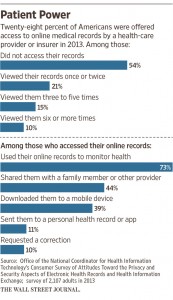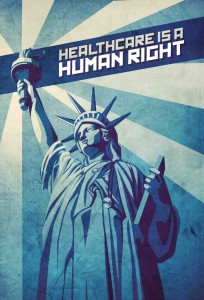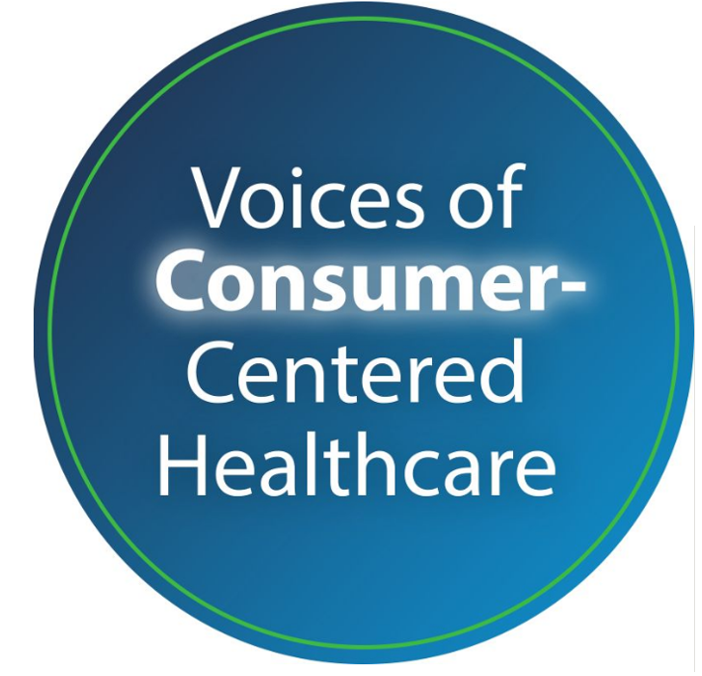In the growing shared economy, one centerpiece is people-powered health – co-creating, shared decision-making, and a greater appreciation for the impact of social on health. As we approach the mid-point of 2015, there are several signposts pointing to people-powered health/care.
FasterCures launched the Science of Patient Input Project, with the objective of getting the patient’s voice into clinical discovery and decision-making. This video describes the intent of the program and its potential for people-powered health and user/patient-centered drug design, beyond the pure clinical efficacy of therapies.
 Another example of people-powered health comes from The Wall Street Journal dated 29 June 2015, which featured a full section Journal Report on Health Care & Technology with the cover story, How to Take Charge of Your Medical Records. “Patients have a lot to gain by getting access to their health information,” the story says. “They just need to know where to get it — and what to do with it once they have it.” The chart illustrates, though, that only 23% of U.S. patients were offered their medical records online in 2013. With the growing adoption of EHRs in hospitals and doctors’ offices, this number is fast-increasing.
Another example of people-powered health comes from The Wall Street Journal dated 29 June 2015, which featured a full section Journal Report on Health Care & Technology with the cover story, How to Take Charge of Your Medical Records. “Patients have a lot to gain by getting access to their health information,” the story says. “They just need to know where to get it — and what to do with it once they have it.” The chart illustrates, though, that only 23% of U.S. patients were offered their medical records online in 2013. With the growing adoption of EHRs in hospitals and doctors’ offices, this number is fast-increasing.
On the positive side for patient engagement, 3 in 4 people offered their online records used them to monitor their health. And, this study published June 25, 2015, in the Journal of General Internal Medicine, found that most patients want to access health information via physicians’ websites (in today’s health IT environment, these could be portals).
Another story in this section features an interview with Dr. Joseph Kvedar who leads Connected Health at Partners HealthCare in Boston. In Staying Connected Is Crucial to Staying Healthy, Dr. Kvedar talked about lessons learned from over a decade of working with patients and their clinicians on virtual health connections – finding that individuals do respond well to seeing their own health data like blood pressure readings and activity monitoring via sensors, in tandem with ongoing check-ins from a professional (nurse, pharmacist).
Oscar Uses Tech to Improve Care was featured in USA Today, discussing how the new-new insurance company is looking for plan members to health–engage — not just see the health plan as a vehicle for acquiring health insurance. Instead, Oscar is implementing technology platforms and devices that consumers use in other aspects of daily living whether planning for financial management, Skyping (think: telehealth with a physician for virtual consultations), and gifting wearable devices (Oscar currently uses Fitbit) for activity tracking. “Typically, insurers amass customers and then avoid them,” Oscar co-founder Joshua Kushner is quoted. “But we want consumers to engage with us, because the right kind of care gets you healthier, faster.”
 That kind of talk is a joint-venture of health co-creation between consumers/patients and health industry stakeholders who, like Oscar has positioned, welcome that form of engagement and shared-health economy. July 4th is America’s Independence Day, and this year we will celebrate Americans’ ability and right to ask their doctors for their medical records. A cadre of patriotic-patient-centered people have come together to support GetMyHealthData.org, a website which features a petition and advocacy promoting patients health information rights.
That kind of talk is a joint-venture of health co-creation between consumers/patients and health industry stakeholders who, like Oscar has positioned, welcome that form of engagement and shared-health economy. July 4th is America’s Independence Day, and this year we will celebrate Americans’ ability and right to ask their doctors for their medical records. A cadre of patriotic-patient-centered people have come together to support GetMyHealthData.org, a website which features a petition and advocacy promoting patients health information rights.
 With last week’s SCOTUS decision upholding the Affordable Care Act’s provisions for health insurance subsidies across the 50 United States, the Supreme Court preserved American health citizens’ right to access health insurance regardless of pre-existing conditions, or geographic location. Nancy Pelosi told Politico in 2012 that the ACA represents “life, liberty and the pursuit of happiness.”
With last week’s SCOTUS decision upholding the Affordable Care Act’s provisions for health insurance subsidies across the 50 United States, the Supreme Court preserved American health citizens’ right to access health insurance regardless of pre-existing conditions, or geographic location. Nancy Pelosi told Politico in 2012 that the ACA represents “life, liberty and the pursuit of happiness.”
I’ll amend Senator Pelosi’s assertion to say that the ACA, coupled with Americans’ right to personal health data access, represent “life, liberty, and the pursuit of health.”
This week, ask your health care providers for your medical information, and spread the word to your friends, family, and work colleagues. Health is Social. Healthcare is a Human Right, as emblazoned by Lady Liberty on Involution Studios’ Care Card.




 Thank you, Jared Johnson, for including me on the list of the
Thank you, Jared Johnson, for including me on the list of the  I am so grateful to Tom Lawry for asking me to pen the foreword for his book, Health Care Nation,
I am so grateful to Tom Lawry for asking me to pen the foreword for his book, Health Care Nation,  Thanks to Feedspot for naming this blog, Health Populi, as a
Thanks to Feedspot for naming this blog, Health Populi, as a